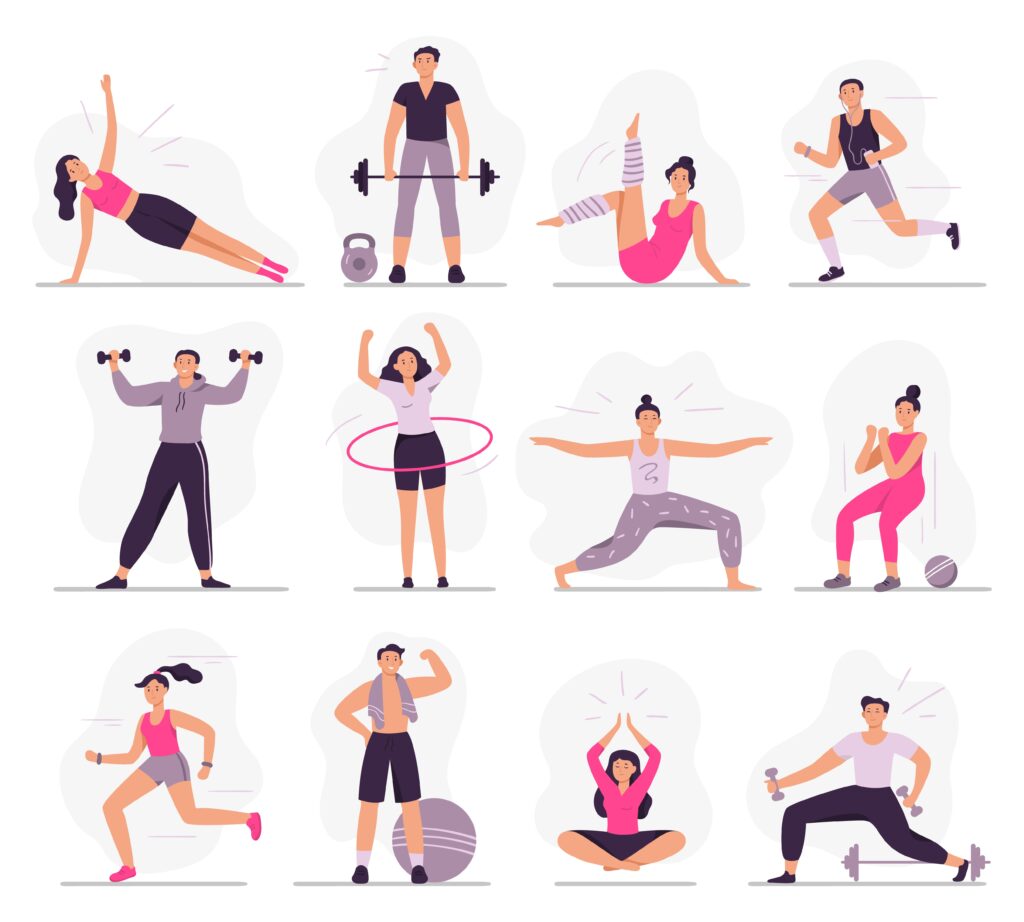
What happens to your body when you exercise?
Instant satisfaction is ingrained in human nature. We take action and anticipate immediate results. Exercise is a great fit for this perspective because it starts to show results right away. And you continue to reap these rewards for the rest of your life.
Exercise puts stress on the body, which changes it to become stronger and more functional. Similarly, if all a person does is sit all day, their fitness level drops, their muscles atrophy, and their bones weaken. Additionally, we’ve become more prone to illness, disease, and premature mortality.
These are some of the adjustments and advantages your body and mind go through to stay healthy, whether you’re just starting out, changing up your training regimen, or working out more.
Immediately After
You most likely feel an increase in your heart and respiratory rates as soon as you start exercising. That’s not all, though. As your blood pressure rises and your blood vessels widen, blood may flow more quickly to your working muscles. Blood is simultaneously diverted from unnecessary regions, such as the intestines and stomach. In addition, several hormones are released and sugar and fat are released for energy.
Your respiration and heart rate slow down right away. Your blood pressure drops and typically drops below its pre-exercise level. The hormones released help to reduce discomfort and improve your mood. Your focus, memory, and energy levels are all higher. Additionally, there is a transient rise in immune cells.
Additionally, blood sugar decreases, however to what extent will depend on how hard you exercise. Short bursts of high intensity exertion produce less of a reduction than moderate, sustained activity. These decreases typically last for a few hours after. Measuring your blood sugar levels before and after exercise is a smart idea if you have diabetes.
Within a Week
The next day, you can feel some discomfort in your muscles if you’re new to exercising or if you’re working out different muscles than usual. It’s normal and normally passes within a day or two. Staying busy aids in your recovery from this. Additionally, as you work out every week, your body will adjust more quickly and you won’t feel this pain.
You’ll discover that falling asleep is simpler throughout the first week, and that the duration and caliber of your sleep get better. As you continue to exercise, you will continue to feel the same sense of enjoyment that you experienced after your first workout. Additionally, you’ll be more resilient to stress.
You’ll notice that your workouts are getting easier by the end of the first week, and you could even feel stronger. Your nervous system’s increased ability to activate the functioning muscles is the cause of this. Also, you might observe an improvement in your coordination.
Within a Month
Your level of fitness will rise in a month. Sedentary women were able to exercise longer, quicker, and with greater power when they performed sprint intervals twice a week for four weeks. However, playing pick-up sports four times a week and engaging in continuous exercise for thirty minutes can both increase fitness levels without the need for sprint intervals.
You may choose to lengthen or intensify your workouts because they will appear simpler given your increased level of fitness compared to just three weeks ago. It will become easier to perform even routine duties like walking up stairs and carrying groceries. You’ll discover that you recuperate more quickly and that it takes less time to reach your resting heart rate. Your arteries also grow more flexible and more effective in supplying blood to your active muscles.
Within Three Months
Your body experiences additional changes throughout the course of the weeks and months. Your muscles’ mitochondria, which are powerhouse cells that produce energy, multiply. Your working muscles become more adept at utilizing oxygen to meet your energy demands as a result. Additionally, your blood volume grows, supplying your muscles with additional oxygen, lipids, and glucose. These modifications lessen the effort your heart must make. The lower your resting heart rate, the more efficient your body will become.
Additionally, a number of heart and other disease risk factors get better. Triglycerides, or blood fats, fall as HDL cholesterol—the good cholesterol—increases. Lower insulin and blood sugar levels are the outcome of improved blood sugar metabolism. Additionally, blood pressure drops while at rest. Furthermore, those who have a higher risk of type 2 diabetes and heart disease likely to see larger benefits.
As the function of your immune system improves, you’ll also notice that you’re less prone to illness. A regimen of eight weeks of exercise reduced the incidence of respiratory illnesses. And even after the sessions ended, this benefit continued for four months.
Additionally, this is the time when people are most likely to give up. Your program’s novelty has worn off, and it’s possible that your new habit hasn’t taken hold. It’s possible that external circumstances will test your discipline and drive. That’s normal, but you can work to incorporate your new habit into your daily routine and revitalize your motivation.
Conclusion: Engaging in physical activity year-round has a beneficial effect on almost every bodily system, resulting in enhanced physical and mental health as well as an overall higher standard of living.